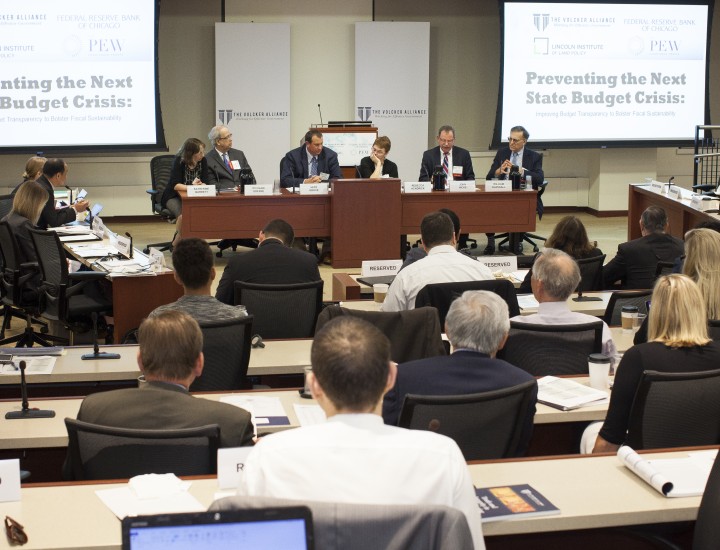Special Briefing: The Road Ahead for the Economy, States, and Localities as Donald Trump and the GOP Take Charge

Major policy shifts in immigration, taxes, trade, energy, health care, and pandemic-era programs passed under the Biden Administration look increasingly likely with Donald Trump capturing the White House and his fellow Republicans taking control of both houses of Congress for the first time in two years. Our panel of experts will share their views on what this sea change may mean for the economy and Federal Reserve, as well as the impact on states, localities, and the $4 trillion municipal bond market, including the possible elimination of the federal tax exemption on most muni bond interest.
Our panel of experts will include Torsten Slok, Partner and Chief Economist, Apollo Global Management; Annie Linskey, Wall Street Journal White House Reporter; Former US Representative Carolyn Bourdeaux (D-GA); Eric Kazatsky, Head of Municipal Strategy, Bloomberg LP; and Teryn Zmuda, Chief Research Officer and Chief Economist, National Association of Counties (NACo).
Moderated by William Glasgall, Volcker Alliance senior director, public finance and Penn IUR fellow, and Susan Wachter, co-director of Penn IUR, this briefing is the fifty-sixth in a series of sixty-minute online conversations featuring experts from the national research networks of the Volcker Alliance and Penn IUR, along with other leading academics, economists, and federal, state, and local leaders.
Special Briefings are made possible by the Volcker Alliance and members of the Penn IUR Advisory Board.
Recordings of the entire Special Briefings series are available on the Volcker Alliance website: SPECIAL BRIEFING SERIES ARCHIVE.
Be sure to subscribe to the Special Briefing podcast, available on Apple Podcasts, Spotify, Google Podcasts, TuneIn, iHeart Radio and more.
Also, be sure to subscribe to the Volcker Alliance newsletter and Penn IUR newsletter.
-----------------------------------------------------------------------------------------------------------------------------------------------------
PANEL OF ECONOMIC, POLICY EXPERTS GAUGE IMPACT OF NEW PRESIDENT, CONGRESS
Special Briefing Panel Examines What May Happen to US Economy, Programs Implemented Under Biden Administration, State and Muni Impact After Trump and GOP Take Charge
Major policy shifts in immigration, taxes, trade, energy, health care, and pandemic-era programs passed under the Biden Administration that look increasingly likely with Donald Trump capturing the White House and fellow Republicans taking control of both houses of Congress for the first time in two years. This sea change holds implications for the economy, Federal Reserve, states, localities, and the $4 trillion municipal bond market, including the possible elimination of the federal tax exemption on most muni bond interest. Panelists explored these issues:
Torsten Slok, partner and chief economist at Apollo Global Management, discussed the big picture for our economy’s short run: “The short version of what’s happening is that the economy is doing really well. GDP growth for the last two and a half years has continued to surprise from the upside.” Slok did add, however, that “The big issue in financial markets and policymaking continues to be why did Fed hikes not slow the economy down more, why was GDP growth in the third quarter 2.8, and why is GDP growth in the fourth quarter, according to the Atlanta Fed, going to be 3.3.”
Wall Street Journal White House Reporter Annie Linskey discussed the Biden administration’s priorities before the transfer of power takes place: “The primary program that they [the White House] are working on which impacts states and localities is getting money out of the door for the CHIPS Act. It was a $39 billion program, about $30 billion of that is tied up right now in complicated negotiations between the government and companies, and so the Biden administration is working very hard right now to get those negotiations finished.”
“This brings me to the DOGE effort, where you have Elon Musk and Vivek Ramaswamy out there pounding their chests about how they are going to make all these dramatic cuts.” said former US Representative Carolyn Bourdeaux (D-GA). Bourdeaux continued: “Most of us who have been around the block on budgeting know that it’s really easy to do this in the abstract, but it is very hard to do it when you are actually putting programs on the line.”
When asked about the impact of federal cuts to budgets and programs on localities, Teryn Zmuda, chief research officer and chief economist at the National Association of Counties, added, “When we’re thinking about the effects of any administration and talking about policy changes, cost cuts could really be cost shifts. Sometimes programs are cut but you do have to think how the effect of that is carried out throughout communities.”
“Right now, state and local payrolls are at the highest levels they’ve been ever. We’ve had 3% growth since the great financial crisis, and 2% growth since 2019,” said Eric Kazatsky, head of municipal strategy at Bloomberg Intelligence. Kazatsky explained: “So, as efficiencies have come into the job market, technology has been embraced even by state and local governments, and payrolls has continued to expand.”
-----------------------------------------------------------------------------------------------------------------------------------------------------

Torsten Slok is chief economist at Apollo Global Management’s executive office in New York. Prior to joining the firm in August 2020, he worked for 15 years on the sell-side, where his team was top-ranked by Institutional Investor in fixed income and equities for ten years, including No. 1 in 2019. Previously he worked at the OECD in Paris, in the Money and Finance Division and the Structural Policy Analysis Division. Before joining the OECD he worked for four years at the IMF in the division responsible for writing the World Economic Outlook and the division responsible for China, Hong Kong, and Mongolia.
Torsten studied at University of Copenhagen and Princeton University. He frequently appears in the media (CNBC, Bloomberg, WSJ, NYT, FT), and has published numerous journal articles and reviews on economics and policy analysis, including in the Journal of International Economics, Journal of International Money and Finance, and The Econometric Journal.

Annie Linskey is a Wall Street Journal White House reporter. Previously, she was a national reporter covering the White House for the Washington Post and covered Democrats in the 2020 presidential campaign as a national political reporter for the newspaper. Linskey was also the lead reporter on Democrats for the Boston Globe Washington bureau during the 2016 campaign. She reported on the Obama White House for Bloomberg News and BusinessWeek. Linskey's first nine years in journalism were spent at the Baltimore Sun, where she covered crime, City Hall and the Maryland State House.
 Carolyn Bourdeaux has built a career at the intersection of policy, politics, and governance. She served as a Democratic Member of Congress from Georgia’s 7th from 2021-2022 after becoming the only Democrat in the country to flip a Congressional seat in 2020. She ran the closest race in the country in the same district in 2018. During her time in Congress, she focused on health care, small business and infrastructure and worked extensively with the bipartisan Problem Solvers Caucus to help pass the Infrastructure Investment and Jobs Act, one of the most significant investments in infrastructure in US history.
Carolyn Bourdeaux has built a career at the intersection of policy, politics, and governance. She served as a Democratic Member of Congress from Georgia’s 7th from 2021-2022 after becoming the only Democrat in the country to flip a Congressional seat in 2020. She ran the closest race in the country in the same district in 2018. During her time in Congress, she focused on health care, small business and infrastructure and worked extensively with the bipartisan Problem Solvers Caucus to help pass the Infrastructure Investment and Jobs Act, one of the most significant investments in infrastructure in US history.
Prior to entering politics, Dr. Bourdeaux built a career as a noted state and local public finance expert and professor of public policy at Georgia State University. During her time there, she often served as a consultant to state and local governments and to elected officials in both parties. Among her many accomplishments, she served as Director of Georgia’s Senate Budget and Evaluation Office during the Great Recession, where she received special recognition by the Senate for her service (S.Res. 1598). She was elected by her peers to the National Academy for Public Administration, served as Chair of the Association for Budgeting and Financial Management, founded the Center for State and Local Finance at Georgia State and wrote an award-winning dissertation on the use of special purpose governments to finance critical community infrastructure.
 Eric Kazatsky is the Head of Municipal Strategy for Bloomberg Intelligence. He is responsible for creating municipal-focused research for the general market as well as Bloomberg Terminal clients. He has 23 years successful experience involving municipal bonds and has spent his career in various aspects of the industry including sell side, buy side and a large municipal issuer. Prior to Bloomberg, Eric served as an institutional desk strategist and municipal portfolio manager. Eric has a B.A. in finance and economics from the University of Pittsburgh, an M.B.A. in finance from St. Joseph’s University, and an M.S. in investment management from Temple University.
Eric Kazatsky is the Head of Municipal Strategy for Bloomberg Intelligence. He is responsible for creating municipal-focused research for the general market as well as Bloomberg Terminal clients. He has 23 years successful experience involving municipal bonds and has spent his career in various aspects of the industry including sell side, buy side and a large municipal issuer. Prior to Bloomberg, Eric served as an institutional desk strategist and municipal portfolio manager. Eric has a B.A. in finance and economics from the University of Pittsburgh, an M.B.A. in finance from St. Joseph’s University, and an M.S. in investment management from Temple University.

Teryn Zmuda is the chief research officer and chief economist at the National Association of Counties (NACo), overseeing the Programs and Practices Division and the Research and Data Analytics Division. Teryn leads efforts to promote NACo as a thought leader, leveraging research and best practices to elevate the county role across the spectrum of local government authorities and policy implementation, within the nation’s intergovernmental system. She also leads NACo's economic analysis, representing the county perspective in federal policy, and guides the development of the issue-focused programmatic work, including peer learning networks and cohorts. Teryn holds an M.A. in applied economics from George Washington University and a B.A. in sociology from the University of Maryland.



